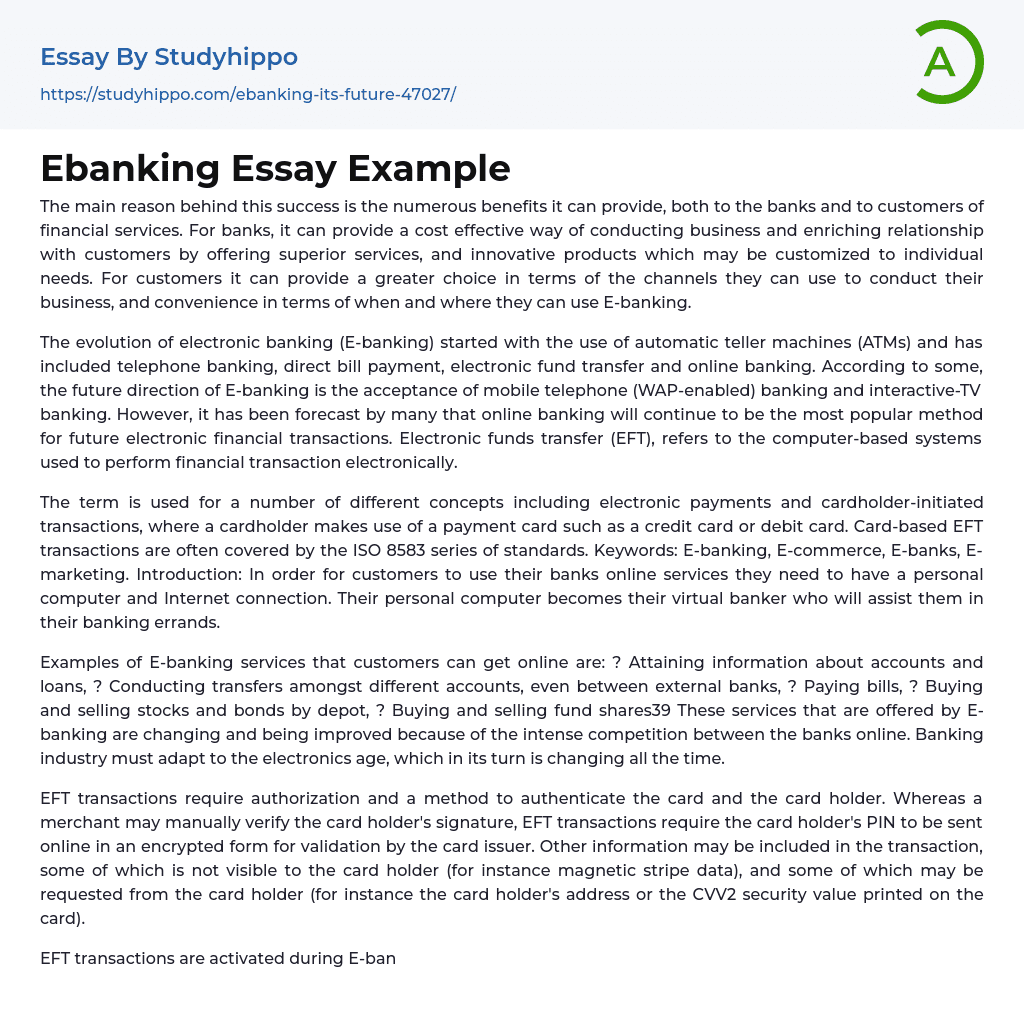The financial services sector has seen great success with online banking, thanks to its numerous advantages. By providing high-quality services and customizable innovative products at a lower cost, banks can enhance their business operations and customer relationships. Customers also enjoy the convenience of conducting financial activities through electronic banking, anytime and anywhere, along with a wider range of options.
Electronic banking, also known as E-banking, commenced with the introduction of automatic teller machines (ATMs) and has since encompassed telephone banking, direct bill payment, electronic fund transfer, and online banking. It is anticipated that mobile telephone banking enabled with wireless application protocol (WAP) and interactive-TV banking will be integrated into the future of E-banking. Nevertheless, various predictions suggest that online banking will remain the favored approach for conducting digital financial transactions moving forward. Electronic funds transfer (EFT) denotes compu
...ter-based systems employed to execute financial transactions electronically.
The term encompasses various concepts, encompassing electronic payments and transactions initiated by cardholders. Such transactions involve the utilization of payment cards like credit or debit cards. The ISO 8583 series of standards typically covers card-based EFT transactions. Keywords such as E-banking, E-commerce, E-banks, and E-marketing hold relevance in this domain. To access their bank's online services, customers require a personal computer and internet connection. Their personal computer effectively assumes the role of a virtual banker, aiding them with their banking activities.
E-banking services available online encompass various options such as accessing account and loan information, conducting transfers between accounts (even across different banks), making bill payments, purchasing stocks and bonds through a depot, and buying or selling fund shares. The competition among online banks drives the continuous evolution an
enhancement of these services. In order to keep pace with the constantly changing digital era, the banking industry must continuously adapt.
EFT transactions require authorization and authentication of both the card and the card holder. Although a merchant can manually authenticate the card holder's signature, EFT transactions require encrypting and transmitting the card holder's PIN online for validation by the card issuer. The transaction may also include additional information, some of which is not visible to the card holder (such as magnetic stripe data), and some of which may be requested from the card holder (such as address or printed CVV2 security value).
EFT transactions can be initiated through different methods of E-banking, including telephone banking, online banking, SMS banking, mobile banking, and interactive-TV banking. No matter the location or time, you have the ability to make payments and stock market orders and get comprehensive account and custody account information. The concept of E-banking involves providing bank services and information via a website on the World Wide Web (WWW).
According to Rayport and Sviokla (1994; 1995), understanding the distribution of goods and services in the digital world is important. They emphasize the distinctions between physical and virtual marketplaces, defining the latter as an information-based arena. In E-banking, customers can use online electronic channels such as the Internet to perform various transactions like accessing accounts, transferring money, making payments, and applying for loans.
Many banks and organizations find the use of this channel attractive because it is cost-effective, increases sales, and provides convenience to customers. Moreover, there are several advantages associated with this medium that will be discussed in the next section. Currently, both financial sector
organizations and others are adopting E-banking by providing services through Wireless Application Protocol (WAP) phones and Interactive Television (iTV).
- Commercial Bank essays
- Debit Card essays
- Deposit Account essays
- Subprime Lending essays
- Bank essays
- Banking essays
- Corporate Finance essays
- Credit Card essays
- Currency essays
- Debt essays
- Donation essays
- Enron Scandal essays
- Equity essays
- Financial Accounting essays
- Financial Crisis essays
- Financial News essays
- Financial Ratios essays
- Financial Services essays
- Forecasting essays
- Foreign Exchange Market essays
- Free Market essays
- Gold essays
- Investment essays
- Legacy essays
- Loan essays
- Market Segmentation essays
- Money essays
- Personal finance essays
- Purchasing essays
- Retirement essays
- Shareholder essays
- Stock Market essays
- Supply And Demand essays
- Venture Capital essays




